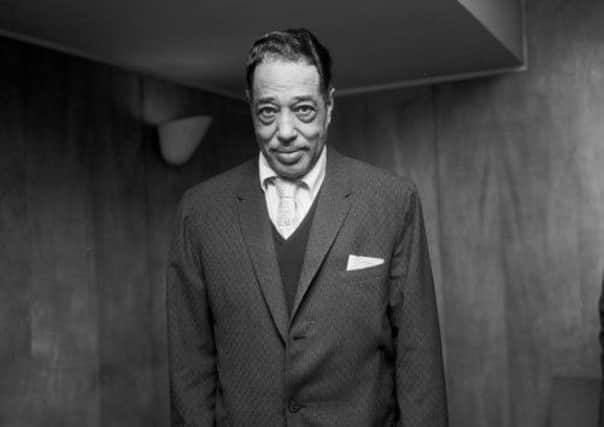Edinburgh Jazz: Duke Ellington’s Sacred Concerts


The best of this music was acclaimed at the time, and its relatively rare performances today can elicit enthusiastic and even emotional responses, says Clark Tracey, who will preside over two performances of this landmark music at the Edinburgh Jazz and Blues Festival, which opens on Friday.
Tracey will forsake his habitual drum stool to conduct a mighty amalgamation of the Edinburgh Jazz Festival Orchestra and the Scottish Chamber Orchestra Chorus, soprano and baritone soloists, and his father, pianist and elder statesman of British jazz, Stan Tracey.
Advertisement
Hide AdEllington described his Sacred Concert music as “the most important thing I have ever done”. Combining jazz and choral classical music with elements of gospel, blues and even tap dancing, it is, says Clark, “magnificent, one of the most profound pieces of music I’ve ever been involved in, and I know that Stan feels the same.”
Premiering the project at Durham Cathedral almost two decades ago, the Traceys have performed their arrangements in such hallowed precincts as York Minster and St Paul’s Cathedral, although this is the project’s first excursion north of the Border.
“Sometimes,” says Clark, “it’s a concert, sometimes it’s performed as an act of worship – so we’ve had a few converts to jazz along the way,” he laughs.
“I don’t think you can date it,” he adds. “It’s a piece of history but it is also, because of its dedication to the service of God, if you will, something very special.
“It goes down a storm, although when it’s done as a service, people don’t know whether to applaud or not. At York Minster it was a massive choir and orchestra, and we held this huge note for four seconds, then I cut it off and there was a natural reverb through the cathedral for ten seconds or so. Then the ministers would just get up and continue the service, so at the end of the whole thing the place erupted.”
The solo vocalists for the Edinburgh performances are the Albanian soprano Teuta Koço and baritone Jerome Knox (who returns during the Fringe to sing in the Okavango Macbeth by Tom Cunningham and Alexander McCall Smith), while the tap dancing honours in the celebrated ‘David Danced Before the Lord’ sequence – first danced by the legendary Bunny Briggs – will be taken by the London dancer Junior Laniyan.
Advertisement
Hide AdThe Edinburgh Jazz Festival traditionally occupies a diversity of venues, from mainstream concert halls such as the Queen’s Hall to fringe-style venues such as the Spiegeltent. This year, however, the festival spans the Forth to mount one of the two Sacred Concerts in what should prove a resonant space in every sense, Dunfermline Abbey (the other performance is in the Queen’s Hall).
Stan Tracey, now 86, hadn’t been feeling too well at the time of this interview, but he still plans to play in the Ellington piece, which, he agrees, was a challenge when he first took it on. “But, you know, that’s what I do,” he observes, in typically laconic terms.
Advertisement
Hide Ad“It’s a tremendous work, and I’m looking forward to it, as I always do.”
As Clark says, “Stan’s voicings on the piano can be very Ellingtonian anyway, and I can’t think of anyone better for the job. He doesn’t think too much about how Ellington would have done it, he just plays the way he hears and wants it, and it comes out right.”
The concerts are just part of a ten-day festival programme encompassing that broad church that is jazz. Crowd-drawers include US saxophonist Tia Fuller, a long-time player in Beyoncé’s group; Jools Holland; veteran Geordie blues-rocker Eric Burdon and the Animals; as well as the offspring of two legendary names – pianist Darius Brubeck, son of the late Dave, and Mud Morganfield, son of Muddy Waters.
Other visitors include New York singer-pianist Champian Fulton, gypsy swinger Fapy Lafertin, Neil Cowley’s power piano trio and high-energy fusioneers Hidden Orchestra and Snarky Puppy. Stan Tracey will also bring his own quartet, featuring his celebrated Scots mate Bobby Wellins on sax.
There are home-grown jazz luminaries a-plenty, often playing or sharing the bill with visitors: pianist Brian Kellock with his Copenhagen Trio, Konrad Wiszniewski and Euan Stevenson re-visiting their New Focus triumph with the Vilnius Quartet, while Sue McKenzie of the Scottish Saxophone Ensemble introduces her new chamber jazz ensemble, Dark Grooves, with Canadian cellist Lucio Amanti.
The progressive jazz-folk duo of Graeme Stephen and Fraser Fifield appears with similarly folk-inclined Sizhukong from Taiwan, Ken Mathieson’s Classic Jazz Orchestra gets back to jazz roots with star New Orleans clarinettist Evan Christopher, while saxophonist Phil Bancroft and legendary free-jazz crusader Pharaoh Sanders appear together with their respective quartets.
Duke Ellington’s Sacred Concert is at Dunfermline Abbey on 23 July and at the Queen’s Hall on 24 July. www.edinburghjazzfestival.com